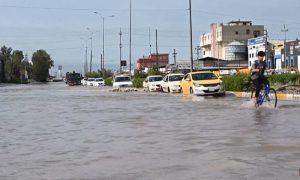UNITED NATIONS: The World Meteorological Organization (WMO) has released its State of the Climate in Asia 2023 report, revealing that Asia faced a barrage of weather, climate, and water-related hazards, solidifying its status as the most disaster-affected region globally.
The report underscores the accelerating impact of climate change on the continent, with extreme events like storms, floods, droughts, and heatwaves taking a severe toll on societies and economies.
Asia is heating up at a rate nearly double the global average, resulting in increased casualties and economic losses from floods, storms, and intense heatwaves. Sea-surface temperatures in the northwest Pacific hit record highs, with sea surface warming in certain areas of Asia outpacing global trends by more than threefold.
The report identifies the Barents Sea as a climate change hotspot, highlighting unprecedented warming.
In 2023 alone, Asia experienced 79 water hazard-related disasters, predominantly floods and storms, leading to over 2,000 fatalities and affecting nine million people directly. Extreme heatwaves gripped Pakistan and other parts of the region, contributing to the continent’s second-highest annual mean near-surface temperature on record.
Despite overall lower precipitation levels in key regions like the Turan Lowland and the Himalayas, Asia witnessed extreme rainfall events, including floods and storms across India, Pakistan, and Nepal. The report also notes the alarming retreat of glaciers across High-Mountain Asia, accelerated permafrost thawing in the Arctic, and a range of other extreme weather phenomena affecting millions.
Over the past five decades, Asia has endured 3,612 weather, climate, and water-related disasters, resulting in nearly one million deaths and $1.4 trillion in economic losses. Tropical cyclones emerged as the leading cause of natural disaster-related deaths in the region.
To address these challenges, the WMO and its partners advocate for robust early warning systems and disaster risk reduction measures to save lives and prevent future climate-induced crises. The report emphasizes the critical need for climate resilience and adaptation strategies, underlining the imperative for collective action to confront Asia’s escalating climate crisis.






















